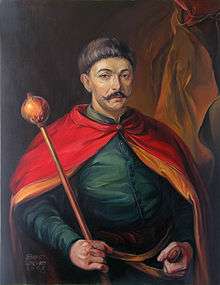Ivan Briukhovetsky
Ivan Briukhovetsky (Ukrainian: Іван Брюховецький, Polish: Iwan Brzuchowiecki, Russian: Иван Брюховецкий) (died 18 June 1668) was a hetman of Left-bank Ukraine from 1663 to 1668. In the early years of rule his was positioned as pro-Russian policies incited a rebellion which he later joined in an attempt to salvage his reputation and authority. Later leader of the Anti-Moscow uprising. His assessments as a rule differ in the part of Ukrainian historians which are supporters Petro Doroshenko.
Ivan Bryukhovetsky | |
|---|---|
 | |
| Hetman of Zaporizhian Host | |
| In office 27 June 1663 – 17 June 1668 | |
| Preceded by | Yurii Khmelnytsky |
| Succeeded by | Petro Doroshenko |
| Zaporizhia Kosh Otaman | |
| In office 1661–1663 | |
| Preceded by | Petro Sukhoviy |
| Succeeded by | Satsko Turovets[1] |
| Personal details | |
| Born | 1623 near Dykanka, Polish–Lithuanian Commonwealth |
| Died | 18 June 1668 Budyshchi, Cossack Hetmanate, Tsardom of Muscovy |
| Resting place | Epiphany Church in Hadiach |
| Spouse(s) | Daria Dolgorukova |
| Signature |  |
Biography
He was a registered Cossack, belonging to the Chyhyryn Company (Chyhyryn Regiment). Early in his career he served as Bohdan Khmelnytsky's courier and diplomatic emissary. He was elected Kosh otaman (1661–3) of the Zaporizhian Sich. At the Chorna rada of 1663 he was elected Hetman of the Left Bank with the support of Moscow as an alternative to already elected Hetman Pavlo Teteria. Briukhovetsky's election was at the roots of the division of the Cossack State and is known in history as The Ruin.
However, Briukhovetsky's reign and cruelty worked against him. Early on he arrested and executed his opponents, namely polkovniks Somko and Vasili Zolotarenko. To gain support he signed the Moscow Articles of 1665, which placed Left-bank Ukraine under direct control of the Tsar. In return, Briukhovetsky secured for himself the title of boyar, properties, and marriage to Prince Dolgoruky's daughter. This treaty went on to be called the "Briukhovetsky treaty" and caused massive rebellion in Ukraine. His popularity among the clergy fell when he suggested that Moscow appoint and send a metropolitan to the Kievan Metropolia.
As his domestic policies failed, Briukhovetsky put the blame on the Russian authorities and sided with the Cossacks' rebellion in an attempt to save his reputation, but it was too late. In 1668 in the town of Budyshchi, a Cossack mob, which be bribed Petro Doroshenko,[2] killed him by chaining him to a cannon and beating him to death.[3]
After the murder Briukhovetsky Vijsko Zaporozke Nyzove, who in revenge tried to kill Doroshenko,[4] and Sirko threw the right-bank rebellions. And soon its forces fight against Doroshenko as part of the troops Petro Sukhoviy.
His daughter's father-in-law was his rival Ivan Sirko.
Legacy
After him was named one of kurins of the Zaporozhian Host and later after resettlement of cossacks stanitsa Bryukhovetskaya.
References
- Kosh Otamans at the Dnipropetrovsk city portal
- Розділ V. Козацька ера. § 2. Руїна (1658—1686). // Яковенко Н. Нарис історії України з найдавніших часів до кінця XVIII ст. — Київ, 1997
- PERSPECTIVES: The game goes on (07/30/06)
- Velychko, Samiylo (1991). Litopys Samiyla Velychka. Dnipro Press. ISBN 5-308-00315-7.
Further reading
- W.E.D. Allen. The Ukraine A History. Cambridge University Press, 1941.